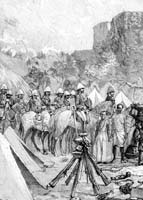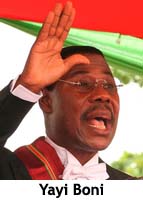The country we refer to as Benin today was once the powerful Kingdom of Dahomey. It was eventually nicknamed the Slave Coast due to significant trafficking through Dahomey of Africans (against their will) to theAmericas, specifically to the slave markets of Brazil and the Caribbean.
 It was transformed into a FrenchColony in the late 1800s, before finally gaining its full independence from France in 1960. The country's current name (Benin) was adopted in 1975.
It was transformed into a FrenchColony in the late 1800s, before finally gaining its full independence from France in 1960. The country's current name (Benin) was adopted in 1975. In the twelve years following their independence, ethnic strife caused a period of agitation, and subsequently, Benin witnessed a series of military coups, a mistaken association with Marxism, and the somewhat typical health and infrastructure problems indigenous to its neighbors, and most West African countries.
Mathieu Kerekou overthrew the ruling triumvirate in 1972, and forced himself into a presidential role, stating that Benin would not "burden itself by copying foreign ideology, and wants neither Capitalism, Communism, nor Socialism."
Riots broke out in 1989 after the banking systemcollapsed, and Kerekou was forced to arrange elections.
In the 1990's Benin became the first African country to successfully transition from a dictatorship to a pluralistic political system, and Prime Minister Nicephore Soglo secured a win in the presidential election, remaining in office until Kerekou returned to power in 1996.
 Yayi Boni assumed office in 2006, following one of the first presidentialelections considered to be free and fair, and in 2011 was reelected to asecond term - becoming the first president to win without a subsequent runoff since 1991.
Yayi Boni assumed office in 2006, following one of the first presidentialelections considered to be free and fair, and in 2011 was reelected to asecond term - becoming the first president to win without a subsequent runoff since 1991. As a new democracy, the bright side is that Benin's economy is growing and tourism is on the increase, especially along the coastal areas, and in the wildlife national parks of the north.
Much of the interior population is still dependent on subsistence farming; growing beans, corn and yams. Important cash crops include cotton, cocoa and coffee.
No comments:
Post a Comment